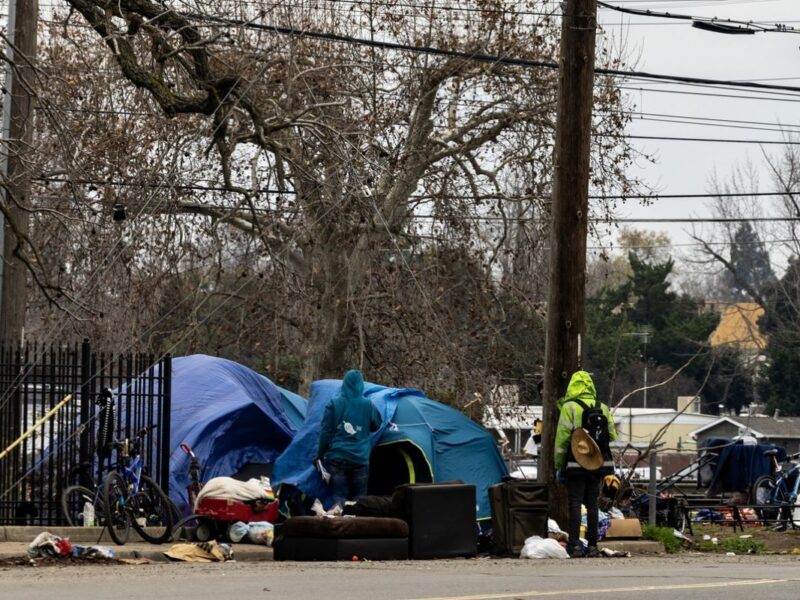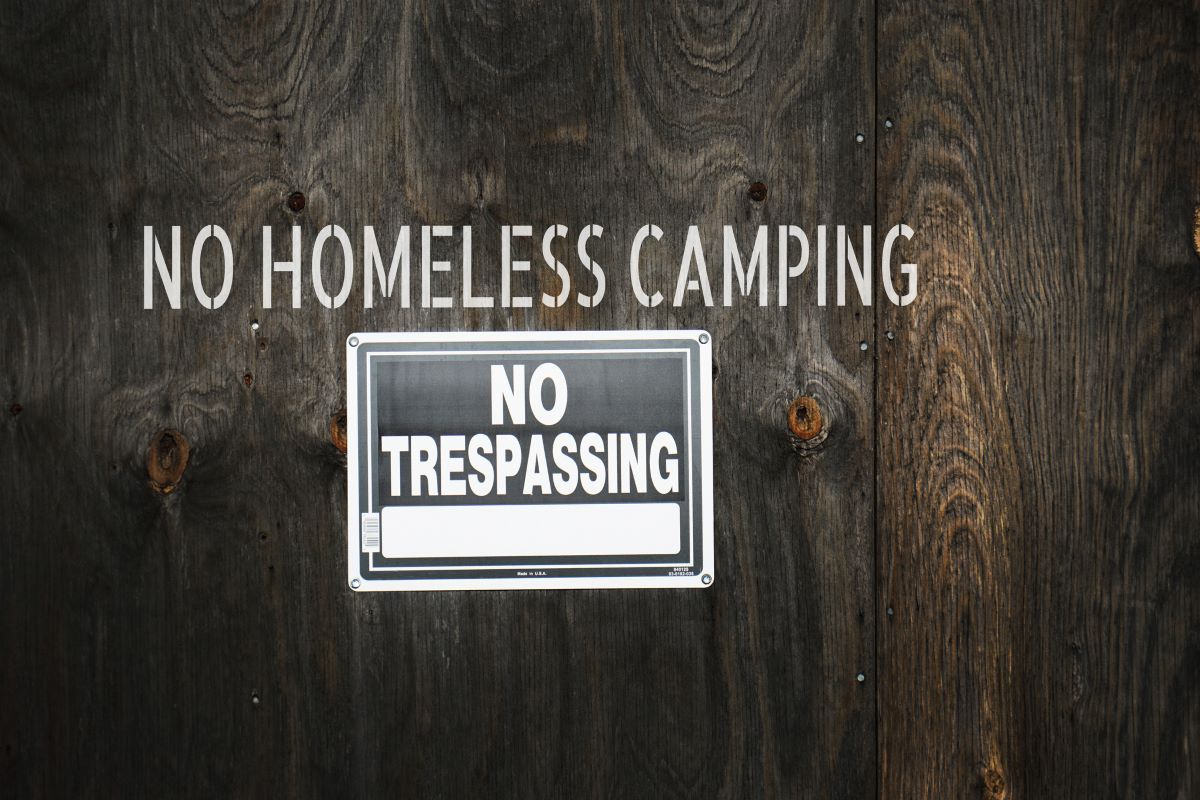Politicians Are Using the Word ‘Unsanctioned’ in Homeless Legislation, Suggesting Sanctioned Encampments Will Become the Norm
For time immemorial, when politicians talk about homelessness, they complain about homeless encampments. Their speeches are often riddled with lies about public safety and half-truths about hygiene that paint our unhoused neighbors unfavorably. Yet, as the financial incentive to push “sanctioned encampments” on the homeless population increases, there has been an ever-so-subtle shift in this language. Now, it seems the only encampments that are posing a threat to public welfare are the ones that are “unsanctioned.”
This shifting narrative foreshadows a dark and ominous future where humans are stockpiled, and all of their actions hinged upon government approval. Let’s explore:
Anti-Camping Legislation is an Inhumane Way to Criminalize People Enduring Homelessness
There has been homelessness in America since the era of colonialization. Unstable residency takes on many different forms. Some houseless people are hidden, tucked away on the sofas of relatives or friends. They are drifting in and out of hotel rooms. Or perhaps they are living in their cars.
Some homeless people are more visible because they sleep outside in spaces unfit for human habitation. This is referred to as unsheltered homelessness or sleeping rough.
Suppose you venture across a major metropolitan city in the wee hours of the night. In that case, you might encounter an entire community filled with rough sleepers, pitching tents, and makeshift shelters in an abandoned park or along the edge of a highway, river, or main street.
Long ago, when this type of homelessness first emerged, people called these outdoor communal spaces shantytowns. Today, they are often called tent cities or simply homeless encampments.
The high level of visibility of these campsites tends to make housed people uncomfortable because it forces them to face the harsh reality that, despite our technological advancements, we still haven’t advanced enough socially to a point where homelessness no longer exists.
There is something else, too, something deeper, that drives this internal hatred. It is the thought that maybe one day, that homeless person we see sifting through the litter on the parkway could be us. After all, a whopping 64% of American workers live paycheck to paycheck, and many are rent-burdened or behind on their mortgages.
Politicians play on this fear in a plea to appeal to the masses. They do so by heinously suggesting that the people living in homeless encampments are undesirable members of society who arrived there through a series of poor decisions.
According to academics and subject matter experts, nothing could be further from the truth. Still, the narrative persists.
To paint a consistent portrait of negativity, politicians then explain how homeless encampments are hazardous to public health and welfare. Residents in modern-day shantytowns must be forcibly evicted, arrested, or forced into temporary accommodations, allegedly “for their own good.”
To further drive the point home, hundreds of laws are on the books that ban public camping, making it a criminal offense. This anti-camping legislation is an inhumane way to criminalize and financially penalize people enduring the horrors of homelessness. But now, an even greater threat is being introduced to the homeless community. It is the ban on “unsanctioned encampments.”
Cities Across the Nation Move to Criminalize ‘Unsanctioned Encampments.’ This is a Push to Impose Sanctioned Encampments, which are Just For-Profit Concentration Camps
In Boulder, Colorado, government officials proclaim their policy is to “disband unsanctioned campsites as quickly as possible…”
According to them, it is not the encampments or the homeless people posing a threat to the community. Rather, it is the fact that their worldly possessions create visible obstructions that make it difficult for housed people to have a good time.
Of course, the underlying subliminal message here is that forcing poverty-stricken individuals and families into encampments is fine as long as their possessions are promptly removed and discarded, and government officials sanction their encampments.
In a public statement addressing these newfangled policies, the National Coalition for the Homeless made the following decree:
“In the current environment in which municipal governments have largely given up on affordable housing solutions to homelessness and instead resorted to using law enforcement as the primary point of contact for those without housing, we see a broader trend in which the mere offer of any kind of assistance or social service is enough for local governments and law enforcement to justify penalty, arrest or a threat to withdraw a person’s liberty for those who reject the help. We believe that sanctioned encampments will be used as permanent placements for local jurisdictions to avoid providing safe, affordable, accessible, and permanent housing.”
The NHC’s Assessment is Right on the Money
There is a great deal of evidence to support the NCH’s projection. The ban on “unsanctioned camping” is not limited to Boulder, Colorado. Similar policies are being put in place in Portland, Oregon. Portland has already approved six massive sanctioned encampment sites that homeless people will alarmingly be forced into against their will.
Much like the notorious internment camps of the past, these sanctioned encampments promise to be heavily monitored, their perimeters patrolled. This experience will inflict more trauma upon our already vulnerable neighbors without walls.
Three similar city-sanctioned encampments took hold in Denver. The director of development and communications, Jennifer Forker, admitted they could become part of the city’s permanent plan to address homelessness.
The city of Austin, Texas, followed suit, opening several city and state-sanctioned encampments and using them as an excuse to enforce strict anti-homeless legislation. This essentially fills the streets and the prison cells with people experiencing homelessness at the behest of the notorious Cicero Institute. This conservative-leaning think tank incentivizes the criminalization of homelessness.
And in Georgia, the original version of Senate Bill 62 included an authorization for government-sanctioned homeless encampments. Met with staunch opposition, the bill has since been amended, but for how long?
Talk to Your Local Legislators about Addressing the Housing Crisis with Actual Housing
Our legislators still believe they can vilify the homeless community and evade their responsibility to address the housing crisis by pulling stunts like this. To make matters worse, conservative think tanks like the Cicero Institute that turn poor people’s pain into profit offer financial incentives to politicians who lobby to construct these horrifying, sanctioned encampments.
Please remind your lawmakers that no human being in 2023 should endure the horror of living outside in a tent – sanctioned or unsanctioned. What we need is legislation that makes housing a human right for all.












